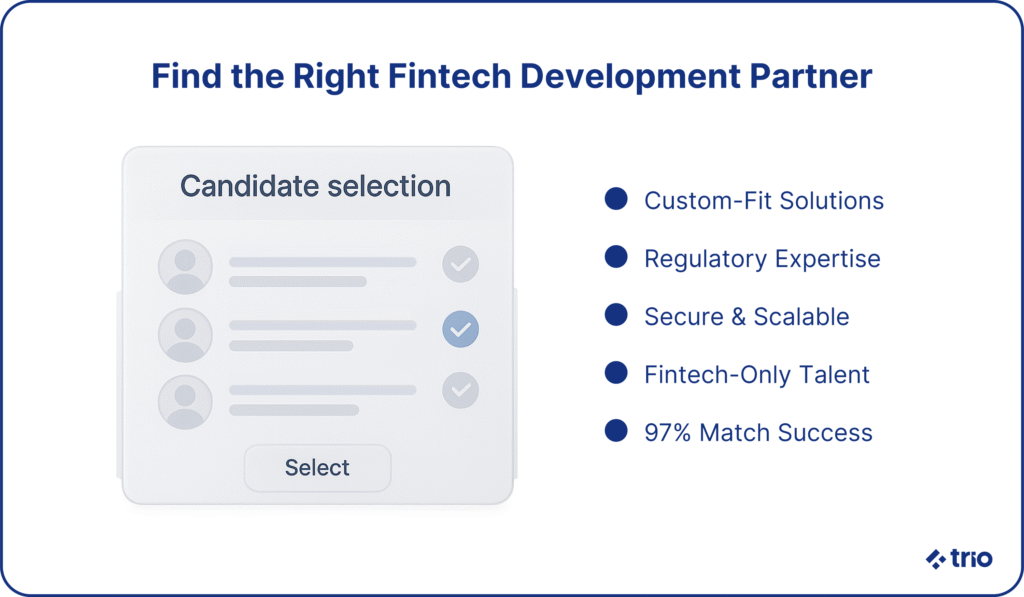Finding the Right Fintech Software Development Company
Fintech software development needs to happen fast and securely. Financial companies that fall behind on either front tend to pay for it twice: once in lost competitive ground, and again in the form of eroding user trust.
Whether you need to build a new fintech app from scratch, modernize a legacy system that has quietly become a liability, or scale your engineering capacity to hit a roadmap deadline, the development partner you choose will shape the outcome.
You could hire individual contractors, or you could work with a company that specializes in fintech development specifically, bringing domain knowledge, vetting processes, and accountability that generalists may not offer.
Mistakes here can be expensive, both in time and money.
So how do you identify the top fintech software development companies and separate the ones worth trusting from those that will cost you later?
In short, the right fintech software development company will demonstrate technical competence in your specific stack, genuine fluency in financial domain requirements, strong security and compliance practices, and a delivery model that does not disappear after launch.
At Trio, we have been connecting clients with senior fintech engineers since 2019. Rather than offering generic teams, we focus on custom fintech software development outsourcing and staff augmentation, so every engagement reflects what your project actually needs.
Key Takeaways
- The best fintech software development partner will match your tech stack and have experience building similar products to yours (insurance platform, neobank, etc.)
- Experience with security certifications like SOC 2, PCI-DSS, and GDPR compliance is one of the main things you should look for.
- A long-term partnership tends to produce the best outcomes because your partner’s success is tied to your own. There is the added benefit that developers are familiar with your code, minimizing onboarding later.
- Evaluating fintech development companies through platforms like Clutch or G2 can be useful, but direct client references tend to reveal more.
Where to Find Potential Fintech Software Development Companies
We should start with the basics. Where do you even look when you decide that you need a fintech software development partner?
The best thing to do is consult those who have already spent some time in the industry and perhaps worked with similar companies before.
This could include referrals from founders, CTOs, or even investors who have worked with fintech development companies.
If someone you trust has had a good experience, that signal carries more weight than any marketing material.
Beyond referrals, platforms like Clutch and G2 aggregate reviews and case studies for software development companies, and allow filtering by industry specialization, company size, and region.
When using these platforms to evaluate fintech development companies, a few things tend to be more informative than others:
- How the company responded to problems in reviews, not just whether the project succeeded overall.
- Whether their listed case studies actually reflect fintech experience or are padded with adjacent work.
- The recency of reviews. A strong track record from three years ago may not reflect the current team’s capabilities.
Once you have a shortlist of partners you would consider trustworthy, you can assess their fit further.

How to Choose the Right Fintech Software Development Company
Having a clear framework before you start evaluating vendors saves significant time and helps you avoid costly mismatches.
Here is a step-by-step process we have seen work reliably across a range of fintech projects.
Step 1: Define Your Business Goals and Technical Requirements
Start by getting specific about what you need.
If you are just starting out, identify must-have features for your MVP, plus the capabilities you plan to add once the core concept proves itself.
Think about who your users are, what they value most, and which regulatory and security standards apply to the regions they operate in.
Compliance requirements tend to follow the end user’s geography rather than the company’s headquarters, so this step matters more than it might initially seem. It is also incredibly complex, as your users might travel before you have expressly prepared for a specific region.
If you are growing an existing product, these same principles apply, but you need to consider what new features you are adding, or why you need additional development, and you may continue to use this additional development in the future.
Step 2: Evaluate Technology Stack and Compatibility
Once you have your feature set, map it to a tech stack for your new features.
Whatever you choose should be actively maintained and scalable. If you already have an internal team or existing codebase, factor in what they already know.
Introducing unfamiliar frameworks adds learning time, which often translates directly into delays and even the most senior developers making mistakes during the development process.
Step 3: Research and Shortlist Potential Partners
Gather at least three or four candidates before committing to any one of them.
You can start with referrals and platforms like Clutch and G2, as we have mentioned above.
When evaluating who to add to your shortlist, make sure that you ask about critical details like how a company handled problems. This information tends to tell you far more than generic information that confirms timely delivery.
Related Reading: Hiring Fintech Developers: Roles, Skills, and Where to Find Them
Step 4: Assess Portfolios and Case Studies
Once you have a shortlist, you can move on to assessing each of the candidates.
A fintech-specific portfolio tells you far more than a general one. Look for projects that share the same compliance context as yours.
For example, evaluating whether a development team has built a KYC-compliant onboarding flow for a lending platform will give you some idea about whether they actually understand the stakes. A general web shop probably does not.
Where case studies reference named clients, it’s a good idea to follow up directly if you can. A ten-minute conversation with a reference will often cover ground that no written review does.
Step 5: Request a Proposal and Compare Engagement Models
Cost-effectiveness and initial affordability are different things, and keeping that distinction clear matters.
A cheaper developer that requires heavy supervision or creates security vulnerabilities and other issues that you will need to address later will almost always cost more in the long run.
You might also be in a situation where you don’t have the talent in place to provide adequate supervision.
Assess what each model actually includes.
In our experience, with fintech software outsourcing specifically, the partner typically covers tooling and infrastructure overhead that an in-house development team would require you to provision separately.
Related Reading: How to Hire Fintech Developers
Step 6: Clarify Communication and Project Governance
Before any contract gets signed, establish communication expectations explicitly.
That means agreeing on reporting cadence, the tools you will use, how escalations work, and who owns which decisions.
A conversation like this will surface cultural and process mismatches early, when they are still easy to address rather than expensive to fix.
The Fintech Development Market: Why Your Choice of Partner Matters More Than Ever
The global fintech market has expanded at a pace that has consistently outrun most forecasts.
Estimates suggest the fintech market is expected to grow by 15% per year until 2028, an incredible number when you consider retail banking is expected to grow at 6% per annum over the same period of time.
That trajectory creates a lot of opportunity for fintech companies, but it also creates pressure.
For CTOs and engineering leaders at fintech startups and scaling financial companies, one practical consequence that we have noted is that development cycles are getting shorter due to an increase in competition.
At the same time, compliance requirements aren’t becoming easier to meet.
A banking app that would have taken eighteen months to build and certify five years ago now needs to move in half that time, in a regulatory environment that has only gotten more demanding.
Failing to move quickly means you risk the competition getting their foot in the door before you, and building a loyal client base that may expand into their other offerings.
Experienced fintech developers who understand those tensions are genuinely scarce, and the gap between what the fintech development market demands and what most generalist software development firms can deliver has widened accordingly.
Working with a company that specializes not just in fintech but in your specific product is a far lower risk option than going with a company that is dipping its toes into the field for the first time.
What Is a Fintech Software Development Company?
A fintech software development company designs, builds, deploys, and maintains software solutions specifically for the finance sector.
The scope spans mobile banking apps, payment gateways, blockchain platforms, robo-advisors, fraud detection tools, insurance technology, and more, but offerings differ from company to company.
Fintech vs. Generalist Developers: Why it Matters
What separates these firms from general software development companies comes down to specialization.
Because their focus stays narrow, fintech development companies have the resources to stay on top of requirements in the regulatory environments and security best practices. Developers also have a better understanding of what users want, and can advise you based on that.
A generalist developer might build a functional app but make mistakes in compliance or forget to take certain things into account. Ultimately, you are the one who will be liable.
Even if the developers have some fintech experience in the past, dabbling in other industries means that they may not have the time to stay on top of the changes that constantly occur in an industry as rapidly growing as fintech, meaning your products will be outdated immediately.
Fintech Sectors Served
The range of sectors covered by modern fintech software development has expanded considerably. Some of the most common areas we see and offer at Trio include:
- Banking and Neobanks
- Insurance Technology (InsurTech)
- Lending Platforms
- WealthTech and Robo-Advisors
- Regulatory Technology (RegTech)
- Blockchain and Cryptocurrency
- Buy Now Pay Later (BNPL) and Credit Models
Vendor or Strategic Partner: Which Do You Need?
A vendor relationship tends to be transactional. You define the scope, they deliver it, and the relationship ends there.
This model can work for clearly defined, bounded work, but it requires more oversight from your side and does not produce the institutional knowledge that makes future iterations faster and cheaper.
A strategic partner for fintech development develops a genuine understanding of your existing product, goals, in-house team, and more.
They can identify problems before they become crises, and move quickly when circumstances change because they already know your system.
Long-term partnerships in fintech tend to produce better outcomes for precisely this reason: when regulations shift, or a new requirement emerges, the team that built the system can adapt it far faster than one learning it from scratch.
At Trio, we prioritize long-term relationships rather than one-off engagements.
Your success shapes ours.
We offer flexible ramp-up and ramp-down options, which means you pay for what you need at any given moment, without the overhead of maintaining a full in-house development team when demand fluctuates.
Related Reading: The Fastest Way to Hire Engineers for Fintech
Conclusion:
Finding the right fintech software development company is critical. The right partner could facilitate your success in a very competitive fintech market. The wrong choice could lead to a loss of user trust and long-term consequences.
It’s important to find someone reputable, with proven experience in fintech specifically, and the unique requirements that the industry faces in terms of security and compliance.
If you are ready to hire today, you are in the right place.
Request talent!
Frequently Asked Questions
What does a fintech software development company actually do?
A fintech software development company builds and maintains software for financial applications. That typically covers payment systems, banking apps, compliance tooling, fraud detection, and financial data infrastructure.
How much does fintech software development cost?
Costs of a fintech software development company vary considerably depending on scope, team size, and whether you engage in-house, offshore, or nearshore. Nearshore LATAM fintech developers at Trio cost between $40 and $90 per hour, depending on their skillset.
What is fintech software outsourcing?
Fintech software outsourcing means developing, and sometimes maintaining, your financial apps using an external team rather than in-house employees. Usually, this is done because of a lack of internal talent or resources.
How do I know if a fintech software development firm has strong enough security practices?
There is no sure way to know if a fintech software development firm has strong enough security practices, but looking at their portfolio and setting a meeting where you can directly question them about their security practices should give you a better idea and minimize risk.
What should I look for when choosing a fintech software development company for a startup?
For fintech startups choosing a fintech software development company specifically, prioritize partners who have previously built a solid fintech MVP quickly without cutting corners on security, and who offer flexible engagement models that let you ramp up or down without long-term commitments.






